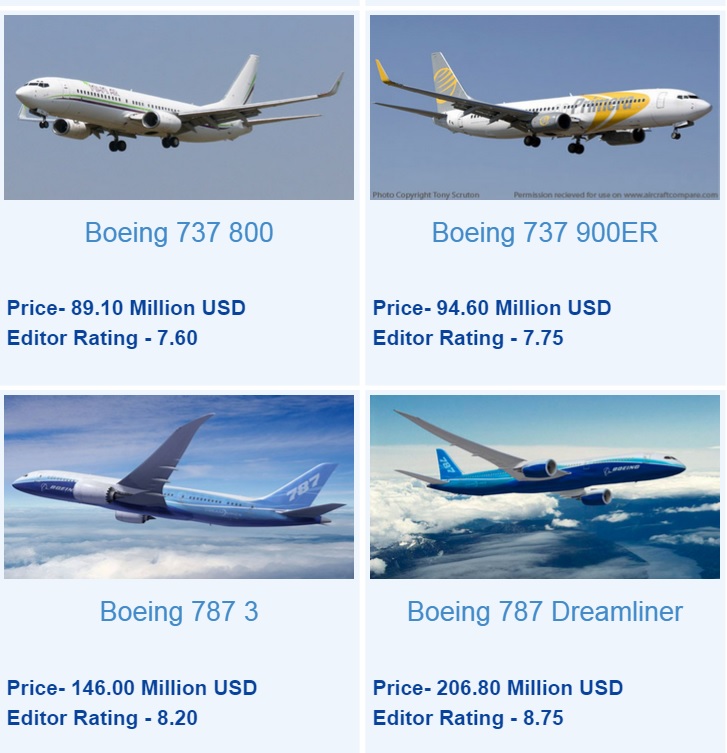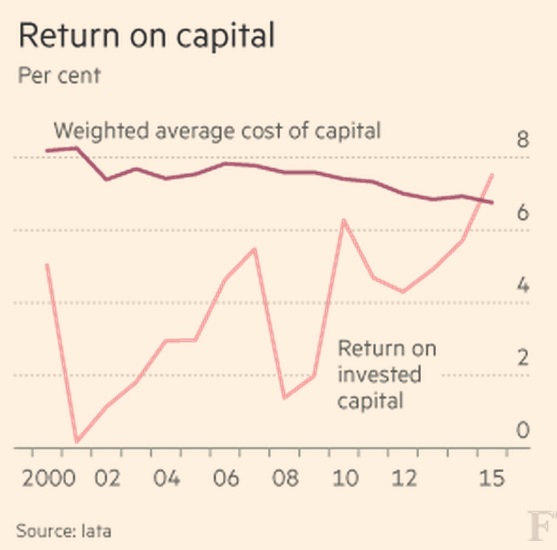The old joke about how to become a millionaire quickly is to start off with a billion dollars and invest in an airline. The idea that airlines are profit-generating machines, earning unfair rates of return on the backs of consumers, is hard to square with this. Which view is right?
Are Airfares “Too High” or “Just Right”?
The list price on a Boeing 737 is $90 million. No question airlines buy these at a discount, and large orders get big discounts. But American Airlines mainline – not counting regional jets farmed out to affiliated carriers – has over 950 planes. That’s a huge capital investment.

If you have money to invest do you buy stocks, bonds, CDs? Or do you put it to work in a business, because you think you can do even better than you could with a more passive investment?
Airlines have only now started to cover their cost of capital, making enough to justify their investment.

(Source: Financial Times)
At higher fuel prices, of course, airfares would need to be higher as well to cover an airline’s cost of capital.
We now see airlines earning enough where it makes sense to invest in aircraft and all of the other costs necessary to run an airline. That’s why we see growth. And it’s also why we see airfares beginning to fall.
Airfares Aren’t High After All
Airfares, including average fees, are down compared to last year. American Airlines announced that in the second quarter its average revenue per seat mile flown was down nearly 7%.
But in 2014 airfares were high compared with record low fares we’ve come to experience. So airfares feel high. The idea that air travel is ‘expensive’ has a certain truthiness.
Adjusted for inflation airfares inclusive of fees were lower in 2014 than they were 15 years earlier. And those fares were lower than at any point in the past. The long run trend is for lower fares. But with record high fuel prices, more than double what they are today, airfares blipped up. We’re seeing that moderate.
How You Lower Airfares — and How You Don’t
The federal government is pursuing claims of collusion against US airlines, arguing that they conspired to restrict flights in order to raise prices. (It’s an odd claim that airlines are colluding when 80% of their attempts to raise prices fail, and when the investigation proceeds at a time that fares are falling and capacity is growing.)
They’re also pursuing a separate investigation over price gouging in the wake of an Amtrak accident outside Philadelphia.
These moves go after unpopular airlines, and create the illusion that the government is ‘doing something’ (both investigations in response to a complaint from a politician). But they don’t hold out hope of driving down prices.
You can’t claim to care about lowering prices if you don’t favor removing restrictions on competition. There are fewer airlines in the US than there used to be, but it doesn’t have to be that way. The government’s legal arguments against recent large mergers weren’t compelling enough to oppose them, I take the government at their word that the analysis was based on law. But the biggest reason we have fewer airlines is because it’s illegal for most of the world’s airlines to operate inside the United States.
The simple solution to fewer airlines and less competition is to eliminate foreign ownership restrictions on US airlines. Then we could have Singapore Airlines, Lufthansa, British Airways, and Ryanair operating carriers inside the United States.
Competition would be brutal, airfares would be low. I wouldn’t want to invest in the sector. We’d see a return to Warren Buffet’s description of investing in the airlines.
“If a capitalist had been present at Kitty Hawk back in the early 1900s, he should have shot Orville Wright. He would have saved his progeny money. But seriously, the airline business has been extraordinary. It has eaten up capital over the past century like almost no other business because people seem to keep coming back to it and putting fresh money in. You’ve got huge fixed costs, you’ve got strong labor unions and you’ve got commodity pricing. That is not a great recipe for success. I have an 800 (free call) number now that I call if I get the urge to buy an airline stock. I call at two in the morning and I say: ‘My name is Warren and I’m an aeroholic.’ And then they talk me down.”
If you want lower airfares there’s an easy solution, it comes from government, but it’s not bread and circuses.


I’m going to hide behind the “lies, damn lies, and statistics” line on the lower airfares claim. I have no doubt that airfares have dropped, but I think that it’s extremely selective. I live in a tertiary city, and see none of the savings that some others enjoy. While I’m happy that Dallas airfares have dropped like a rock, I’m still looking at pretty much the same or worse.
On the foreign ownership front, you’re right. The antiquated laws the U.S. has is way past due for revision. The only counterpoint that I could see would be C.R.A.F., which you either don’t need at all (normally) or need badly. I can easily see the US3 screaming patriotism and defense in order to keep out foreign competition.
@Christian – “I have no doubt that airfares have dropped, but I think that it’s extremely selective”.
Actually, wouldn’t your personal example of living in a tertiary city be a good example of being extremely selective? From personal experience, flights on routes that most people fly do seem to be lower, especially adjusted for inflation. That said, I’d love to see some more detailed information on how those figures were calculated.
@Christian – CRAF is a contractual voluntary commitment that US airlines sign onto because it’s profitable for them to do so. Lots of ways to address what will be mostly a fake concern. US airlines will still commit their fleets. It could become a mandatory requirement for non-US owned airlines operating inside the US to take these subsidies, etc. It’s by no means a stopper.
If the government’s arguments against the mergers it approved weren’t compelling enough to stop airline mergers, then the government made the wrong arguments, or the law failed to adequately account for the interests of consumers.
Even assuming we could somehow get over the huge hurdle of liberalizing worldwide restrictions on foreign ownership of airlines, we would eventually wind up right where we started as new entrant airlines (irrespective of the nationality of ownership) would merge to eliminate competition and gain the benefits the Big three now enjoy.
The key here is inflation. In 1981, preregulation, I paid $1300 for a round-trip from my home overseas to SFO for a standard economy seat. Yes it was a little roomier than today’s and included a meal and two 70# checked suitcases. This winter, according to Kayak, we could fly for about $900 while the $1300 adjusted for inflation comes to $3400 which will buy a business class ticket with lie flat beds! You get what you pay for!
Gary:
You know where I come down on the issue of whether DOJ made good arguments or not in opposing the AA/US merger — they made no arguments and totally surrendered to the political pressure and the fear that they might lose.
As my friend Bill Blechman demonstrated when he litigated the case of Spirit Airlines, Inc. v. Northwest Airlines, Inc, 431 F.3d 917 (6th Cir. 2005) [read the opinion at: http://www.ca6.uscourts.gov/opinions.pdf/05a0473a-06.pdf%5D, each city pair is a separate market for antitrust purposes. A person who wants to go from Detroit to Dallas will not be influenced significantly by a lower fare for Philadelphia to Atlanta, regardless of how low the other fare goes. Therefore a separate structural analysis is required for each city pair. This was one of the fundamental problems in the DOJ surrender.
Whether or not airfares have dropped or not depends on a much more complicated analysis that must take into account the additional fees that passengers now spend, and did not spend in the past. This includes change fees (multiply the average fee times the percentage of passengers paying it in a given period and add it to the average fare), baggage fees (do the same analysis), and the same for other common fees (booking fees, etc.). Otherwise, it’s an apples to kumquats comparison.
And finally, I firmly believe that the cries for patriotism by the U.S. carriers fall into the realm of Samuel Johnson’s aphorism that “Patriotism is the last refuge of the scoundrel”. But, I’m just a cynic.
@Retired Lawyer,
1. The reduction in airfare data I cite above accounts for baggage fees and change fees.
2. The DOJ did a city pair by city pair analysis that they filed with the court when initially objecting to the merger. They were weak though in showing actual concentration in that analysis that any court was going to by under existing precedent. As a non-specialist, though one who did speak to several specialists, I don’t think the DOJ failed to do its job I think they weren’t in a strong position on the law. They were overly aggressive. And while they did see an aggressive political campaign mounted against them they didn’t simply cave under pressure, they simply didn’t have that good an argument in the first place. Now, I *am* surprised they didn’t manage to extract more than they got (eg slots and gates at DCA, gates at DAL, this latter ironically is leading to greater market concentration)….